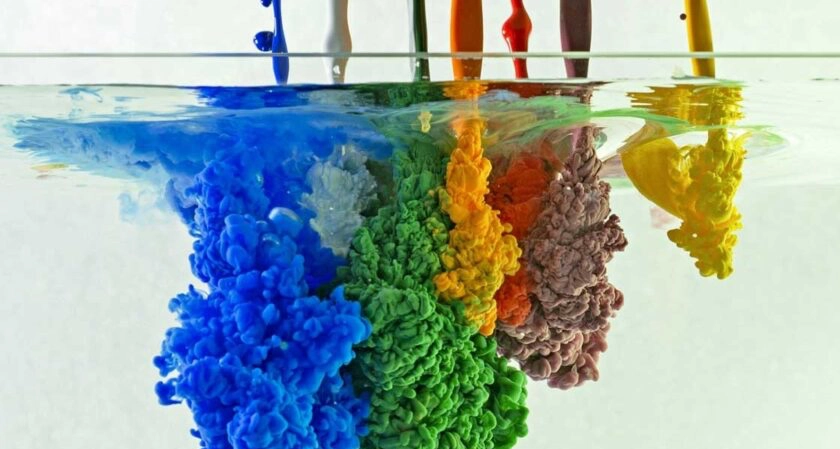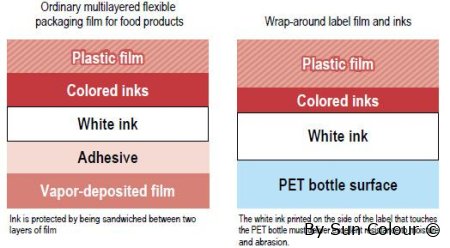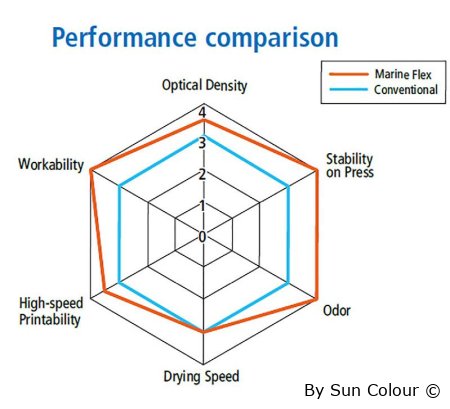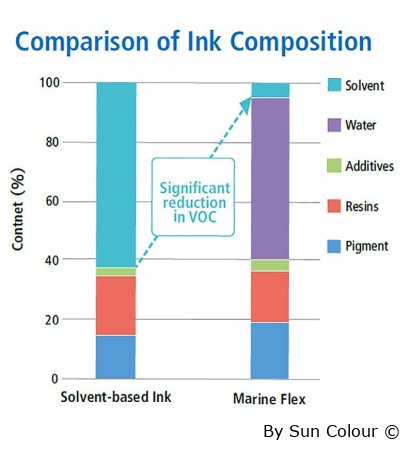
ink viscosity, plate surface drying speed and ph level.
However, certain major beverage manufacturers have stepped up efforts to switch from oil-based gravure to water-based flexographic printing to reduce VOCs and CO2 emissions and conserve energy used in printing on film for PET bottle wrap-around labels and sought to expand the range of products for which such labels are used. Convinced by this trend that its instinct had not been wrong, in July 2017 the project team steered its focus toward developing a new water-based flexo ink for wrap-around labels.
The way forward for the team remained challenging. While films for food packaging commonly consist of three film layers—a substrate and a top layer sandwiching an ink layer—that are laminated together, wrap-around labels comprise two laminated film layers, that is, an ultrathin substrate and a reverse-printed top layer. Moreover, PET bottles have ridges, which enhance strength, recyclability and other properties, so labels must also be able to withstand contact and vibration during transport from factory to warehouse or store and the integrity of inks and label designs must be maintained even if bottles become soaked when used outdoors.
To fulfill such challenging requirements, the project team leveraged the DIC Group’s broad network, asking companies to which potential customers consign the manufacture of wrap-around labels to evaluate the physical properties of prototypes, repeatedly conducting rigorous tests and making continual improvements. The challenges here were many and included developing an exclusive white ink (for white underprinting, which creates opacity so that label design is not influenced by the color of the beverage), selecting a new curing agent, improving wet abrasion resistance during transport and ensuring stable large-lot print quality, i.e., by optimizing
 The team resolved each of these challenges and in December 2018 achieved a water-based flexo ink that passed all material properties evaluation tests and boasted VOCs and CO2 emissions (energy consumption) significantly lower than solventbased gravure inks. The new ink and the Marine Flex ECG digital color management system, developed by DIC Graphics, together make it possible to use multicolor process printing instead of spot colors for printing on flexible packaging and thus to reduce wasted ink and improve operating rates for printing equipment. Soon afterward, the new ink—Marine Flex LM-R— was chosen by Suntory Beverage & Food Limited for use on the labels of the 2.0-liter bottles of its core Suntory Tennensui water. Shipments to Suntory began in May 2019.
The team resolved each of these challenges and in December 2018 achieved a water-based flexo ink that passed all material properties evaluation tests and boasted VOCs and CO2 emissions (energy consumption) significantly lower than solventbased gravure inks. The new ink and the Marine Flex ECG digital color management system, developed by DIC Graphics, together make it possible to use multicolor process printing instead of spot colors for printing on flexible packaging and thus to reduce wasted ink and improve operating rates for printing equipment. Soon afterward, the new ink—Marine Flex LM-R— was chosen by Suntory Beverage & Food Limited for use on the labels of the 2.0-liter bottles of its core Suntory Tennensui water. Shipments to Suntory began in May 2019.


Suntory: A Customer’s Story Sustainability Initiatives Since its founding in 1899, the Suntory Group has sought to contribute to
technologies to ensure the same high definition and productivity as gravure inks, but the outstanding environmental performance of Marine Flex LM-R encouraged us to take the plunge. We thus became the first company in the beverage industry to adopt water-based flexo inks for this purpose.
a sustainable society as a company committed to “Mizu To Ikiru”‘ (“living with water”). To this end, we are committed to delivering products and services of the highest quality, as well as to promoting initiatives aimed at ensuring harmony with nature.
Based on its long-term Environmental Vision toward 2050, the Suntory Group has set targets for 2030 and has long been an industry leader in promoting efforts to reduce CO2 emissions and its environmental impact. Having positioned issues related to water as its priority, the group is implementing a variety of next-generation initiatives in line with the Suntory Group Water Philosophy, including the Outdoor School of Forest and Water and the Suntory Mizuiku Natural Water Education program, with the aim of teaching people about the importance of water. Employees also contribute to society by taking part in tree thinning and planting activities at water sources. conventional materials lighter, thinner and more compact to modifying existing and developing new materials. With consumer awareness of sustainability and rising demand for recyclable packaging and easily removable labels rising, the environmental soundness of products is expected to directly affect end users’ purchasing trends in the years ahead.
In addition to ensuring stable supplies, enhanced quality and cost competitiveness, the Suntory Group looks for materials that offer a lower environmental impact. This belief was behind its recent decision to adopt DIC’s Marine Flex LM-R water-based flexo ink for printing wrap-around labels. The decision to print labels with water-based flexo inks presented several challenges, including developing The Suntory Group places a strong emphasis on environmental protection in all areas of its operations. In considering whether to adopt waterbased flexo inks, we weighed up the risk of being the first company to do so against the risk of not taking this step. Recognizing the potential impact of environment-friendly water-based inks on the packaging industry as a whole, we became the first company to adopt DIC’s Marine Flex LM-R waterbased flexo ink. By more quickly developing increasingly innovative environmentfriendly packaging, we can help pass on a sustainable global environment to the next generation.
Accordingly, our focus is on driving our industry forward, rather than on maintaining the status quo. We look forward to seeing DIC continue to actively disseminate information on the environmental benefits of waterbased flexo inks and encourage their use, as well as to raise awareness of environmental issues. Environmentfriendly materials will continue to be an important consideration for packaging manufacturers, so we also look forward to new ideas and suggestions from DIC in the years ahead.
The Suntory Group is also promoting the development and adoption of environment-friendly packaging through its “2R + B” (Reduce, Recycle + Bio) strategy, as well as through bottle-to-bottle recycling, and has introduced PET bottle caps made with 30% bio-derived materials. Such initiatives continue to earn high marks. Reducing the Environmental Impact of Packaging